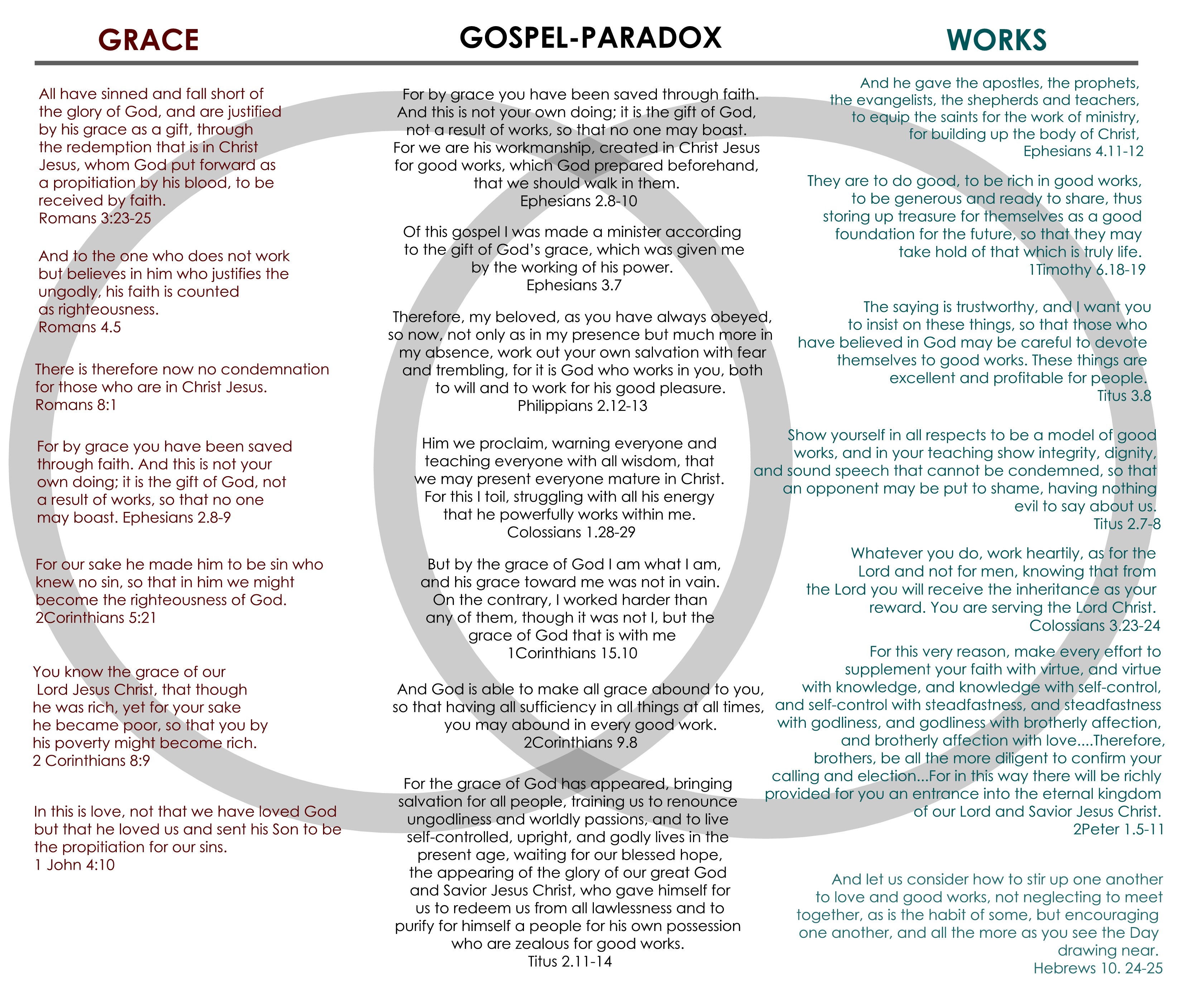Simple thoughts on God, Jesus, and the Bible
Sanctification 103: The Holy Spirit & Me
This third blog about sanctification has one simple point: Everything was done by Jesus, not so that you could do nothing, but so that you would desire and be able to do something. That "something" is gospel-inspired, spirit-empowered, pursuit of righteousness and fight against unrighteousness. The purpose of this pursuit is, ultimately, satisfaction in God. I would agree with John Piper whose life is devoted to the belief that: God is most glorified when I am most satisfied in Him. In other words, satisfaction in God and glorification of God are intimately connected. I believe that obedience, which begins with believing the gospel, is the greatest way to glorify God AND be satisfied. I agree with Jesus who said in John 15 that abiding in Him, through obedience to His commands, results in joy. Sadly, calling people to pursue obedience is rarely perceived as having to do with experiencing joy in Jesus. On [...]
Sanctification 102: The tools and how they work
Our sanctification began before CREATION. According to His purposes, to the praise of His grace, God SET APART a people to be saved from sin. Sanctification is completely accomplished (IN OUR SOULS) through faith in the death and resurrection of Jesus, increased throughout life in our flesh by the Spirit (IN OUR BODIES) , and completed at Jesus’ return. There some argument over prepratory sanctification, minimal argument over positional sanctification, and a lot of argument over progressive sanctification. Essentially, there is a lot of confusion about how we grow in our holiness if Jesus has already made us holy. It is true that God demands our holiness. That is why he sent His Son to be a substitute for us--he produced the holiness I needed through a sinless life and paid the penalty for the unholiness of my sin. God demands perfection, that is why He gave us His substitute. But [...]
Sanctification 101: The Different Kinds
For the last several Wednesdays, our church has been spending time exploring the theological concept of sanctification. Simply stated, the idea behind sanctification is that of "setting apart" someone, or something, for special use. Biblically, this primarily describes the act of God who separates or consecrates something as holy. The first instance of this happening is when God sanctifies the 7th day of creation—recognizing it as holy. The secondary meaning of the word involves the idea of “moral” or “ethical” renewal or cleansing. In this sense, “sanctification” connotes the idea of a process being made more holy or righteous as read in passages like: 1Thessalonians 4.3-5 For this is the will of God, your sanctification: that you abstain from sexual immorality; 4 that each one of you know how to control his own body in holiness and honor, 5 not in the passion of lust like the Gentiles who do not know God. Theologically, sanctification is [...]
On God, Science, and the Age of the Universe
This past Sunday I preached a sermon focused in the six days of creation. I began the sermon by reading Psalm 19.1-2: The heavens declare the glory of God, and the sky above proclaims his handwork. Day to day pours out speech and night to night reveals knowledge. The point of beginning with this Psalm was to remind us of the true purpose of creation—to make much of God. Essentially, instead of always asking HOW questions, I wanted us to focus on WHY questions. It is difficult to ask these kinds of questions with this particular text because there is such a great divide created by one’s understanding of “how” the six days of creation unfolded. In an effort to make sense of God’s Word, men often mistakenly accommodate science to the point of compromise or dismiss it as all together evil or at least mostly wrong. The first sermon, [...]
The trouble with talking about sanctification
The trouble with talking about sanctification is that our flesh always gets in the way. Even if we know that the ACT of God’s grace (justification) has secured our union with Christ, we wrongly believe that our communion with Christ (sanctification) is a work dependent upon ourselves. Without question, there is an inescapable tension between justification and sanctification; between our position of holiness and our practice of holiness; between faith and works. 12 Therefore, my beloved, as you have always obeyed, so now, not only as in my presence but much more in my absence, work out your own salvation with fear and trembling, 13 for it is God who works in you, both to will and to work for his good pleasure. Philippians 2.12-13 How does it all happen? It is all God? Is it all me? There are two ditches on each side of the road. In one [...]
The best sermon I have ever heard.
I don't listen to many of the sermons of my contemporaries. For the most part, this is because I can't help but play the "comparison" game with them--a game I usually lose . Such is not the case with Tim Keller. I figure I'll never be able to preach like him, and that is a good thing. I enjoy Tim Keller's preaching immensely. His sermons are deeply intellectual but, like CS Lewis, easily accessible. Bottom line, he is an older man I respect and his sermons are smarter and shorter than mine will ever be. He can accomplish in one 30 minute sermon what would take me 30 sermons. Below is a link to, quite possibly, the best sermon I have ever heard from anyone. It is about our Covenant God and, unlike most "sermons" preached today, it proclaims the gospel boldly, clearly, and simply. Enjoy.http://sermons2.redeemer.com/sermons/covenant-relationship
Resermon: on pleasing God
To say we should aim to "please God" can easily sound anti-gospel. I believe we should hope to please God, if for no other reason, because God hopes for us to please Him. Pleasing God is the same thing we would hope that our own children would want to do for us. Whether or not my children "please" me through obedience does not dictate my love them for them. If I'm displeased with my children's disobedience, that does not mean that I cease to love them. My unconditional affection for them is not based on their behavior. At the same time, my greatest hope for them is to please me because I believe that their obedience will lead to joy, success, and long life. As their Father, therefore, I can desire, expect, and ask them to please me through obedience. Without question, my hope is that their obedience is their [...]
Head Coverings and How to Handle Difficult Texts (p2)
So, do women have to wear head coverings or not? I believe the answer is no. Of course, there are a few Christiansgroups that continue the practice. Many individuals, groups, and denominations use this text to support their belief and, although we disagree, I respect their faithful commitment to Biblical authority. The question is not whether the practice should be stopped by churches that do, but whether or not it should be required for all of Christian churches who don't. I believe that asking the right questions reveals this to be a practice that is not normative, nor required. The New Testament does not evidence a clear command to practice this in all churches nor is there a repeatable pattern or form in Paul's other letters. Church history does indicate this practice became somewhat normative but, as with many things, recent church history has eliminated the practice as a whole. As with [...]
Head Coverings and How to Handle Difficult Texts (P1)
Last night, I had the joy of wrestling through a difficult text with a small group of friends. The text, 1Corinthians 11.2-16 has proven to be difficult to understand and receive. Commands about marital authority and/or warnings against androgyny are not popular topics in today's culture. Additionally, there are verses dealing with head coverings and statements about angels watching church services that are just plain confusing. Pastor Chris Rich preached a sermon on this last Sunday and wisely focused on what the passage clearly does say about the relationships between men and women, husbands and wives. Our discussion last night brought to mine several issues that might be helpful in dealing with texts like this. It would be difficult for anyone to read this text and not come to the question: "Are woman supposed to wear head coverings or not?" Before answering that question, we must determine whether or not the passage [...]



